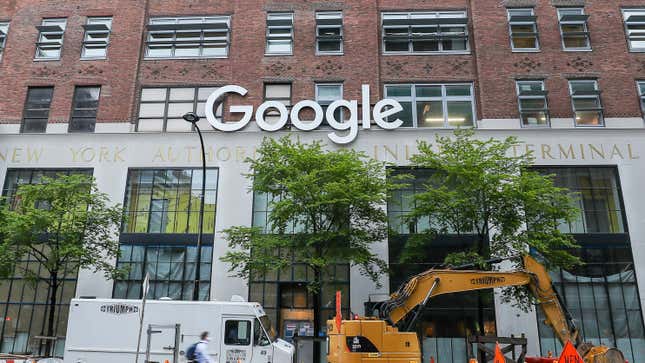
Our tech overlords are talking up their climate game again. On Monday, Google executives claimed their company is now “carbon neutral.”
“Google’s lifetime net carbon footprint is now zero,” Sundar Pichai, CEO of Google and its parent company, Alphabet, said in a blog post. “We’re pleased to be the first major company to get this done, today.”
Pichai said the firm is now moving onto a new goal: running the entire business on carbon-free energy sources, including offices, campuses, and data centers. This all sounds great! Or at least, it would if it weren’t a giant vat of bullshit.
Google didn’t actually go back in time and stop itself from producing millions of tons of greenhouse gas pollution. Instead, it offset those emissions, meaning it paid for green projects elsewhere to make up for its environmental impact. The company told BBC its offsets have mostly been focused on capturing methane gas where it leaks out of pig farms and landfill sites.
Having less methane in the atmosphere is good, but we should get there by moving away from animal agriculture and reducing waste to eliminate the methane emissions at the source. Services like Google’s offset programs run the risk of leading polluting companies to believe they can just keep running their businesses as usual as long as they clean up their excess emissions. But even with less pollution, those models are still fundamentally unsustainable.
To be fair, Google is attempting to move away from offsets with its next big undertaking of cleaning up its power supply. Right now, the company says they’re neutralizing the carbon footprint of its total energy usage by buying renewable energy elsewhere, neutralizing its own use of fossil-based power in places where it isn’t running on renewables. By 2030, it aims to change that by actually running on 100% carbon-free power sources.
That’s an ambitious goal for a tech giant, sure. But it still shouldn’t be able to govern its own path to reaching it. We absolutely need to stop using fossil fuels, but not all renewable energy is created equal. The process of creating solar, wind, and battery storage could all screw up the Earth’s biodiversity and be dependent on abusive labor practices if we don’t pay careful attention to the supply chain. Who’s going to make sure Google does that? It’s not like we can vote on how it decarbonizes—it’s accountable to its shareholders, not users. That means it’s likely to prioritize its profits in decarbonization above all else.
As Google cleans up its own power supply, it also says it’s going to help cities and corporations do the same by selling its services. That means Google gets to profit off the clean energy transition. And frankly, some of the stuff the company will be selling sounds downright scary. For instance, it plans to hock machine learning based tools, including Google Cloud and an artificial intelligence technology called DeepMind, to airports, shopping malls, hospitals, data centers and other commercial buildings and industrial facilities. The firm says these will reduce the need to use air conditioning in these buildings. There are plenty of clean and low-tech ways to do that already without AI—but you can bet Google isn’t interested in many of them because they’re cheap and present few opportunities to continually maximize profits, including mining people’s personal data.
Big Tech’s continued expansion into climate services is another reason that it needs to be more tightly regulated. Google is a company that’s worth $1 trillion dollars and counting. All that wealth gives Google a ton of political power, since it can spend millions to lobby elected officials, which makes it pretty difficult to convince those policymakers to reign them in. Now, it could be on the road to decarbonizing without effective oversight on if its practices are effective, sustainable, use equitable labor, and respect our privacy.
To avoid all of this, there are other options. We could tax the hell out of Google and companies like it and put the funds into a more democratically controlled system of decarbonization. Or we could make an even bigger change and nationalize tech giants so they’re completely under government control. After all, it’s undemocratic, poorly regulated corporations that are largely responsible for getting us into the climate crisis in the first place. To get us out, perhaps it’s time to try something new.